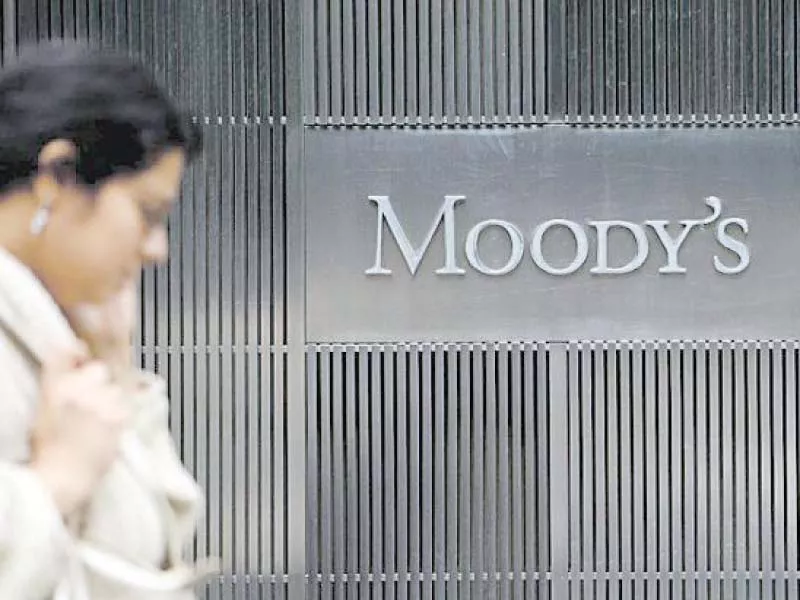Moody’s puts Pakistan under watch
May downgrade country’s long-term local and foreign credit ratings
KARACHI: Moody’s Investors Service - one of top three global credit rating agencies - has put Pakistan under watch for possible downgrade of its long-term local and foreign credit ratings, suspecting that Islamabad may default on debt repayments to “private sector creditors” due to economic mess under the coronavirus pandemic.“Moody’s has placed the government of Pakistan’s local and foreign currency long-term issuer and senior unsecured B3 rating under review for downgrade,” the US-based rating agency announced on Thursday.
“Consistent with Moody’s approach globally, the review period will allow the rating agency to assess whether Pakistan … would likely entail default on private sector debt,” it said. The rating agency, however, did not mention the duration of the review period, as to how long it would monitor Islamabad’s debt repayment activities and when it would announce its final decision regarding downgrade.
Moody’s said Pakistan had improved its economic indicators well before the outbreak of Covid-19 late in March and was still capable of continuing to pay off the debt on time.
However, the possible deterioration in the country’s current account deficit, likely depletion in its foreign currency reserves and low tax and non-tax revenue collections due to limited economic activities and anticipated contraction in the domestic economy may weaken the government’s ability to continue paying off the debt on time, going forward, the agency said.
Moody’s alert may turn the rupee-dollar exchange rate volatile and may increase cost of new foreign borrowing for the country in international markets, an analyst said.
Moody’s said the decision to place the ratings under review for downgrade reflected its expectation that the government would request for bilateral official sector debt service relief under the recently announced G20 initiative.
“Suspension of debt service obligations to official creditors would be unlikely to have rating implications; indeed such relief would increase the fiscal resources available to the government for essential health and social spending due to the coronavirus outbreak,” it said.
“However, G20 has called on private sector creditors to participate in the initiative on comparable terms. Consistent with Moody’s approach globally, the review period will allow the rating agency to assess whether Pakistan’s participation in the initiative would likely entail default on private sector debt, notwithstanding the intended voluntary nature of private sector participation and the fact that the country has not, to Moody’s knowledge, indicated interest in extending the debt service relief request to the private sector; and, if so, whether any losses expected to arise from that participation would be consistent with a lower rating,” it said.
The G20 call for the private sector creditors to participate in the initiative on comparable terms “suggests that, for the countries that elect to seek official sector debt service relief, the initiative may also lead to the suspension of payments or renegotiation of private sector debt service obligations. It is in this context that Moody’s has placed Pakistan’s ratings under review,” the agency said.
“Pakistan has not indicated any interest in extending the debt service relief to include private sector creditors,” it said.
“The rating would likely be downgraded should Moody’s conclude that participation in the G20 debt service relief initiative would probably entail default on private sector debt and that losses experienced would likely exceed the threshold consistent with a B3 rating,” it said.
“The rating would likely be confirmed at its current level (stable at B3) should Moody’s conclude that participation in bilateral official sector debt service relief would unlikely entail default on private sector debt or, if it would, that any losses experienced would likely be minimal.”
The rapid spread of the coronavirus, sharp deterioration in the global economic outlook and a significant reduction in risk appetite are creating a severe economic and financial shock. “For Pakistan, the current shock transmits mainly through a sharp slowdown in economic activity, lower tax revenue as economic activity slows, and higher government financing needs relative to pre-coronavirus levels,” it said.
“However, ongoing reforms that pointed to nascent improvement in credit fundamentals before the outbreak and financing from development partners contain the pressure on the sovereign’s liquidity and external positions.”
Economy, debt to shrink
Moody’s expects Pakistan’s economy to contract by around 1% in fiscal year 2020 (ending June 2020) and to grow by 2-3% in fiscal 2021 - below potential.
The economic slowdown will weigh on government revenue and modestly raise spending, in turn pushing the fiscal deficit wider to close to 10% of GDP in fiscal year 2020.
As a result, Moody’s projects the government’s debt burden will reach around 85-90% of GDP in fiscal year 2020. However, the government’s commitment to fiscal reforms, including under its 2019-22 International Monetary Fund (IMF) programme, provides a crucial anchor for the continued expansion of its revenue base when economic activity gradually normalises.
“Overall, Moody’s expects that the debt burden will return to a downward trend after the initial shock.”
Published in The Express Tribune, May 15th, 2020.
Like Business on Facebook, follow @TribuneBiz on Twitter to stay informed and join in the conversation.


COMMENTS
Comments are moderated and generally will be posted if they are on-topic and not abusive.
For more information, please see our Comments FAQ